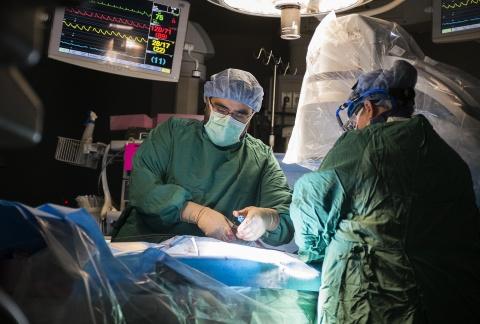
Photo: Mani Daneshmand, MD, performs a double lung transplant in November 2015
Duke Health’s heart and lung transplant programs have a long history of performing complicated transplants with outstanding success. That reputation was put to a challenging test on December 1, when Duke surgeons and their teams at Duke University Hospital successfully performed three heart transplants and two double lung transplants within a 24-hour period.
Despite a full schedule of important surgeries that day, the transplants were performed without impacting the ability of the scheduled surgeries to take place as planned.
“It was business as usual throughout the Heart Center,” said Mani A. Daneshmand, MD, Assistant Professor in the Division of Cardiothoracic Surgery, who performed one of the heart transplant procurements. “We have a systematic team, each with a ‘deep bench’ of committed staff who made this possible. Because these transplants happened in such close proximity, it required the support of every member of the team -- anesthesia, OR nursing, ICU nursing, critical care, perfusion, and surgery. Without everyone pulling together this would have been impossible.”
Jacob Schroder, MD, implanted two of the hearts. Carmelo Milano, MD, implanted one.
Matthew G. Hartwig, MD, MHS, who performed one of the double lung transplants and is Associate Professor of Surgery and Surgical Director of Lung and Heart-Lung Transplantation, said that Duke makes a commitment to its patients to always pursue an appropriate donor organ, whenever it becomes available, for all potential recipients.
“The entire team pitches in when necessary to make sure everyone is taken care of safely and effectively. There’s no way to plan for when a donor organ will become available, and all members of the team have to be able to flex up at a moment’s notice to enable these surgeries to take place. I know the on-call operating room staff were pushed to their limits and beyond on Dec. 1, and it would have been impossible to do this sort of thing without their support and commitment to the process.”
-Matthew G. Hartwig, MD, Associate Professor of Surgery, Surgical Director of Lung and Heart-Lung Transplantation
Jacob Klapper, MD, performed the other double lung transplant.
Duke's heart transplant program is one of the nation’s largest, and has been named one of the highest performing heart transplant centers in the country. In 2014, Duke performed its 1,000th transplant – a significant milestone that has been achieved by only a handful of centers.
Duke’s lung transplant program is the largest lung transplant program in the United States. More than 1,600 lung transplants have been performed at Duke since 1992, with 108 occurring in 2015. Duke’s wait time on its lung transplant list averages about 14 days; the national average is four months.
“Our transplant teams do incredible work every day,” said Jill Engel, DNP, RN, FNP, ANP, ACNP, CCRN-CSC, associate chief nursing officer of Heart Services. “Their dedication is an inspiration to all of us.”
December 1 capped a busy three-day period in which four hearts and four double lungs were transplanted. It also came in the midst of a flurry of 28 transplants in the 10-day period between November 25 and December 6: five hearts, 11 kidney/kidney-pancreas/pancreas, five livers, and seven double lungs.
Duke Transplant Program
Duke has been a pioneer in solid organ transplantation since establishing one of the nation’s first kidney transplant programs in 1965. Today, our reputation as one of the nation’s top transplant centers focuses on our delivery of care to hundreds of adults and children each year. Our survival rates among organ transplant recipients consistently rank among the best in the United States.